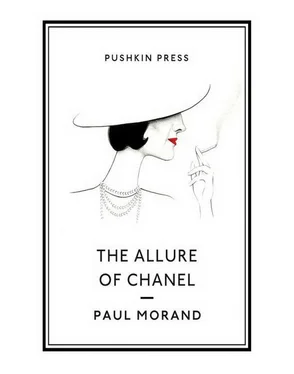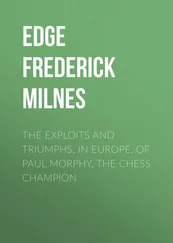And so I furnished the Faubourg Saint-Honoré. Plush carpet everywhere, ‘ colorado claro ’ in colour, with silky tints, like good cigars, woven to my specifications, and brown velvet curtains with gold braiding that looked like coronets girdled in yellow silk from Winston’s. I never discussed prices; only my friends protested, and Misia pulled out her hair in despair. Polovtzoff had bought a Savonnerie carpet from the Duc de C, for one hundred thousand francs.
I’VE KNOWN MANY CELEBRITIES, those on the wane and those up and coming. If I speak of them, it is not so as to hitch my wagon to their train, but because I have preferred their company to all others. And because those who have come to know me, even when we have been acquaintances for twenty years, make me laugh.
After my days spent working in the rue Cambon, interrupted by a hurried tea at Fleurs, in the Faubourg Saint-Honoré, I didn’t much feel like going out. Yet Paris, at that time, was experiencing its strangest and most brilliant years. London and New York (I’m not talking about Berlin, which was buckling then under the throes of devaluation, hunger and expressionism) had their eyes trained on us. From the rue Cambon to Montparnasse, I watched as the Faubourg Saint-Germain attuned itself, princesses opened tea shops that bore the names of well-known books, the White Russians landed, and Europe patched things up for one last time as best it could. The Philippe Berthelots threw their final glittering party: after his reconciliation with the Tiger,9 at the end of the Peace Conference, Philippe, in spite of Poincaré, was very much back in good favour; this had ceased under Millerand, but it was still the case, nonetheless; supported by Bailby, by his brother André, by Bader, Léon Blum, Misia, and by his old friends, he still continued to be something of the force he had been under Briand, during the first two years of the war.
I still remember a delightful Christmas Eve party at rue Cambon. Cocteau had brought along ‘ les Six ’. The young group of student musicians, led by Satie, was at the height of the fame it enjoyed in the early days of Le Boeuf sur le toit. Poulenc had just discarded his soldier’s uniform, Auric was in love with Irène Lagut, Honegger and Darius Milhaud, who was not yet a family man, already had, as they say, a good ‘grounding’ behind them, even though Milhaud was not yet the Saint-Saëns of that generation. There were thirty or so of us: Germaine Taillefer, looking cool and beautiful, Jane Bathori, Ricardo Vinès, Stravinsky, Morand, Segonzac, Sert, Misia, Godebski and the Philippe Berthelots. Fargue arrived, ushering in Ravel; Philippe, his high, curly-haired forehead motionless, was threatening to recite La Légende des siècles , Cocteau had brought along his jazz music from Gaya’s, Segonzac was doing imitations of peasants, and Hélène Berthelot, in a Chinese silk dress, looked as if she was at the foyer of the Oeuvre theatre. Satie was talking to me about a ballet. He suddenly stopped speaking, for Misia, with her brioche on her head, looking anxious and sniffing some dark intrigue, was approaching his chair. Satie, his hand covering his twisted mouth and his goatee beard, his pince-nez dangling, whispered to me:
“Here comes the cat, let’s hide our birds …”
Cocteau was describing how he had been at the Lycée Condorcet with Mistinguett’s son, “nowadays a doctor with a large beard, who lives in Brazil”.
9 Georges Clemenceau’s nickname [Tr]
THE MOST COMPLICATED MAN I ever knew was Paul Iribe. He criticised me for not being simple. (By that remark alone, ever since Jean-Jacques’ day, you can recognise a complex human being.) I thought I was. Deep down, perhaps I’m not? Simplicity does not mean walking around barefoot or wearing clogs, it comes from the spirit, it springs from the heart.
“I don’t understand,” he said, “why you need so many rooms … What’s the point of all these objects? Your way of life is ruining you. What a waste! Why do you need all these servants? One eats too well in your house. I’d come here more often, I might live close to you, if you knew how to be happy with nothing. I loathe pointless gestures, vast expenditure and complicated human beings.”
Filled with the hypocritical desire to refine my needs and a sincere wish to be pleasant to him, I replied:
“So be it. I shall become simple. I shall reduce my standard of living.”
Not far from the rue Cambon, I found a ‘family house’ in which I rented two rooms. Since this modest accommodation did not include any bathrooms, I had one built. I installed another, arranged my favourite books, a Coromandel screen, two heaters and a few fine rugs. When he saw me leaving my house, Iribe was annoyed, jealous, unhappy.
“I’m boarding out,” I told him. “It’s very convenient; I’m round the corner from my home and I’m going to start living the famous simple life.”
“Does it amuse you,” he said, “to play the midinette ?”
I told him that he was responsible for all these changes. I was waiting for him, too, to rent some modest room, since he loved the simple life so much. But he did nothing of the kind and asked me irritably:
“Are you happy?”
“Very happy.”
“What are you playing at? Do you plan to stay there for long?”
I put on an act.
“You wanted me to leave the wood panelling, the marble and the wrought iron: here’s my cottage. The concierge does her cooking on the stairs. Your feet knock into empty milk bottles. Isn’t this the life you wanted me to lead and that you youself want to lead?”
“Do you think I’m used to living in such hovels?” he said in disgust.
And he moved in to the Ritz, opposite me.
My relationship with Iribe was a passionate one. How I loathe passion! What an abomination, what a ghastly disease! The passionate man is an athlete, he knows neither hunger, nor cold, nor exhaustion; he lives miraculously. Passion is Lourdes on a daily basis: look at that paralysed old woman who is wounded in her love: she runs down the stairs with the legs of a twenty-year-old. The passionate man takes no notice of the outside world or of other people; he sees them merely as instruments; the weather, happiness, the neighbour’s rights, these things don’t exist for him; he knows no obstacles, he overcomes everything; he possesses the patience of an ant and the strength of an elephant. He has no respect for other human beings. Along with fear, passion is the true paroxysm. The passionate man will go and wake up the President of the Republic to satisfy his vice, or, without a moment’s hesitation, he will commit all sorts of wrongdoing and go back to sleep, fully placated.
I had great affection for Paul and was very fond of him, but now that he is dead, and after such a long time, I can’t help feeling irritated when I think of the atmosphere of passion he built around me. He wore me out, he ruined my health. When Iribe had left Paris for America, I was beginning to be very well known. My emerging celebrity had eclipsed his declining glory. He loved me, subconsciously, when he returned in 193– so as to be free of this complex and in order to avenge himself on what he had been denied. For him I represented that Paris he had been unable to possess and control, from which he had departed in a sulk to join Cecil de Mille, down in his boring, gloomy studios in California. I was his due. He hadn’t had me when he should have had me and he intended to take this belated revenge. Too belated for both of us; but it’s never too late to mollify those phantoms that we call complexes.
Iribe loved me, but he did so because of all those things that he never admitted to himself, nor admitted to me; he loved me with the secret hope of destroying me. He longed for me to be crushed and humiliated, he wanted me to die. It would have made him deeply happy to see me belong totally to him, impoverished, reduced to helplessness, paralysed and driving a small car. He was a very perverse creature, very affectionate, very intelligent, very self-seeking and exceptionally sophisticated. He would say to me:
Читать дальше












